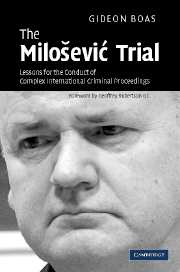Book contents
- Frontmatter
- Contents
- Foreword
- Preface
- Introduction
- 1 FAIR AND EXPEDITIOUS INTERNATIONAL CRIMINAL TRIALS
- 2 THE MILOŠEVIĆ PROSECUTION CASE – GETTING OFF ON THE WRONG FOOT
- 3 CASE MANAGEMENT CHALLENGES IN THE MILOŠEVIĆ TRIAL
- 4 REPRESENTATION AND RESOURCE ISSUES IN INTERNATIONAL CRIMINAL LAW
- 5 CONCLUSIONS
- Index
3 - CASE MANAGEMENT CHALLENGES IN THE MILOŠEVIĆ TRIAL
Published online by Cambridge University Press: 18 February 2010
- Frontmatter
- Contents
- Foreword
- Preface
- Introduction
- 1 FAIR AND EXPEDITIOUS INTERNATIONAL CRIMINAL TRIALS
- 2 THE MILOŠEVIĆ PROSECUTION CASE – GETTING OFF ON THE WRONG FOOT
- 3 CASE MANAGEMENT CHALLENGES IN THE MILOŠEVIĆ TRIAL
- 4 REPRESENTATION AND RESOURCE ISSUES IN INTERNATIONAL CRIMINAL LAW
- 5 CONCLUSIONS
- Index
Summary
The Trial Chamber used a heavy hand in the management of the Milošević trial – far more so than in most international criminal trials before it. The accused himself was, especially early on in the trial, obstructive in a number of ways. In opening arguments, the cross-examination of prosecution witnesses and in the presentation of his defence, he mounted a highly politicised case, often straying from the forensic into long speeches or vitriol. He refused to recognise the legitimacy of the Tribunal from the start, although he ultimately cooperated in many respects with the trial process. He was found to have manipulated his own health for strategic gain and was in other ways highly disruptive. This was also one of the largest cases imaginable. Milošević represented himself throughout the trial, except for a brief period between the decision of the Trial Chamber imposing defence counsel on him, and the effective reversal by the Appeals Chamber of that decision two months later.
At the same time, there should be no illusion or mystique about why this case took so long and why it was so complicated. The prosecution embarked on an extraordinarily broad and complex case. For the myriad of problems associated with the particularities of this accused and his conduct throughout the trial, it was the prosecution that authored the course of this trial – as is normally the case in an adversarial criminal trial process.
This chapter will first analyse the prosecution and defence cases in the Milošević trial, considering the way in which the Trial Chamber sought to manage the proceedings.
- Type
- Chapter
- Information
- The Milošević TrialLessons for the Conduct of Complex International Criminal Proceedings, pp. 131 - 204Publisher: Cambridge University PressPrint publication year: 2007



